- Home
- Maggie O'Farrell
Instructions for a Heatwave
Instructions for a Heatwave Read online
INSTRUCTIONS FOR A HEATWAVE
MAGGIE O’FARRELL
Copyright © 2013 Maggie O’Farrell
The right of Maggie O’Farrell to be identified as the Author of the Work has been asserted by her in accordance with the Copyright, Designs and Patents Act 1988.
First published in Great Britain in 2013 by Tinder Press
An imprint of HEADLINE PUBLISHING GROUP
Apart from any use permitted under UK copyright law, this publication may only be reproduced, stored, or transmitted, in any form, or by any means, with prior permission in writing of the publishers or, in the case of reprographic production, in accordance with the terms of licences issued by the Copyright Licensing Agency.
All characters in this publication are fictitious and any resemblance to real persons, living or dead, is purely coincidental.
Cataloguing in Publication Data is available from the British Library
eISBN 978 0 7553 8683 3
HEADLINE PUBLISHING GROUP
An Hachette UK Company
338 Euston Road
London NW1 3BH
www.tinderpress.co.uk
www.headline.co.uk
www.hachette.co.uk
Table of Contents
Title Page
Copyright
About the Author
Praise for Maggie O’Farrell
Also by Maggie O’Farrell
About the Book
Dedication
Acknowledgements
Thursday
Highbury, London
Stoke Newington, London
Gloucestershire
New York
Friday
Home
Sunday
Ireland
Maggie O’Farrell is the author of five previous novels: After You’d Gone, My Lover’s Lover, The Distance Between Us, which won a Somerset Maugham Award, The Vanishing Act of Esme Lennox, and The Hand That First Held Mine, which won the Costa Novel Award. She lives in Edinburgh.
Praise for Maggie O’Farrell:
‘I was entranced . . . what a brilliant storyteller she is’ Esther Freud, Daily Telegraph
‘Terrific’ Audrey Niffenegger
‘Exquisitely sensual’ Emma Donohue
‘Beautifully written and thought-provoking’ Grazia Magazine
‘A masterful gift for storytelling’ The Observer
‘An entirely encompassing and beautiful read’ Heat
‘Spellbinding’ Barbara Trapido
Also by Maggie O’Farrell:
AFTER YOU’D GONE
THE DISTANCE BETWEEN US
MY LOVER’S LOVER
THE VANISHING ACT OF ESME LENNOX
THE HAND THAT FIRST HELD MINE
About the Book
It’s July 1976 and London is in the grip of a heatwave. It hasn’t rained for months, the gardens are filled with aphids, water comes from a standpipe and Robert Riordan tells his wife Gretta that he’s going round the corner to buy a newspaper. He doesn’t come back.
The search for Robert brings Gretta’s children – two estranged sisters and a brother on the brink of divorce – back home, each with different ideas as to where their father may have gone. None of them suspects that their mother might have an explanation that even now she cannot share.
Maggie O’Farrell’s sixth book is both an intimate portrait of a family in crisis, and the work of an outstanding novelist at the height of her powers.
For S and I and J
and B, of course
Acknowledgements
Thank you, Mary-Anne Harrington and Victoria Hobbs.
Thank you, Emily Griffin, Hazel Orme, Georgina Moore, Helena Towers, Emily Kitchin and all at Headline.
Thank you, Jordan Pavlin.
Thank you, Ruthie.
Thank you, Bridget.
Thank you to my mother for, among other things, the loan of the Connemara map, and to my father for meteorological detail; any inaccuracies are, of course, my own . . .
Thank you, Wendy McMurdo, for filling me in on the life of a photographer’s assistant.
Thank you, Carly Pattinson and Rebecca Tamas, for patience and imagination.
Thank you, Juno. Thank you, Iris. Thank you, Saul.
And thank you, Will, for – well – everything.
THURSDAY
15 July 1976
4) i) . . . the only permitted use of water will be for:
(a) Drinking, and or;
(b) The washing of clothes or of the body, and or;
(c) Both public and private toilets.
Drought Act 1976
An Act to respond to water shortages and droughts in the United Kingdom.
Highbury, London
The heat, the heat. It wakes Gretta just after dawn, propelling her from the bed and down the stairs. It inhabits the house like a guest who has outstayed his welcome: it lies along corridors, it circles around curtains, it lolls heavily on sofas and chairs. The air in the kitchen is like a solid entity filling the space, pushing Gretta down into the floor, against the side of the table.
Only she would choose to bake bread in such weather.
Consider her now, yanking open the oven and grimacing in its scorching blast as she pulls out the bread tin. She is in her nightdress, hair still wound into curlers. She takes two steps backwards and tips the steaming loaf into the sink, the weight of it reminding her, as it always does, of a baby, a newborn, the packed, damp warmth of it.
She has made soda bread three times a week for her entire married life. She is not about to let a little thing like a heatwave get in the way of that. Of course, living in London, it is impossible to get buttermilk; she has to make do with a mixture of half milk and half yoghurt. A woman at Mass told her it worked and it does, up to a point, but it is never quite the same.
At a clacking sound on the lino behind her, she says, ‘Is that you? Bread’s ready.’
‘It’s going to be—’ he begins, then stops.
Gretta waits for a moment before turning round. Robert is standing between the sink and the table, his large hands upturned, as if he’s holding a tea tray. He is staring at something. The tarnished chrome of the tap, perhaps, the runnels of the draining-board, that rusting enamel pan. Everything around them is so familiar, it’s impossible sometimes to tell what your eye has been trained upon, the way a person can no longer hear the individual notes of a known piece of music.
‘It’s going to be a what?’ she demands. He doesn’t reply. She moves towards him and places a palm on his shoulder. ‘You all right?’ She has, of late, been finding herself reminded of his age, the sudden stoop of his back, the look of mild confusion on his face.
‘What?’ He swings his head around to look at her, as if startled by her touch. ‘Yes,’ he nods, ‘of course. I was just saying it’s going to be another hot one today.’
He shuffles sideways, just as she’d known he would, towards the thermometer, which clings, by a spit-moistened sucker, to the outside of the window.
It is the third month of the drought. For ten days now the heat has passed 90ºF. There has been no rain – not for days, not for weeks, not for months. No clouds pass, slow and stately as ships, over the roofs of these houses.
With a metallic click, like that of a hammer tapping a nail, a black spot lands on the window, as if pulled there by magnetic force. Robert, still peering at the thermometer, flinches. The insect has a striated underside, six legs splaying outwards. Another appears, at the other end of the window, then another, then another.
‘Those buggers are back,’ he murmurs.
Gretta comes to see, jamming on her glasses. T ogether, they peer at them, transfixed.
Swarms of red-backed aphids have, in the past week, been passing over the city. They mass in trees, on car windscreens. They catch in the hair of children coming home from school, they find their way into the mouths of those crazy enough to cycle in this heat, their feet adhere to the sun-creamed limbs of people lying in their back gardens.
The aphids fling themselves from the window, their feet detaching at the same moment, as if alerted by some secret signal, and they disappear into the azure sky.
Gretta and Robert straighten up, in unison, relieved.
‘That’s them gone,’ he says.
She sees him glance at the clock on the wall – a quarter to seven. At precisely this time, for more than thirty years, he would leave the house. He would take his coat off the peg by the door, pick up his bag, call goodbye to them all, shouting and squawking in the kitchen, and slam the door behind him. He always left at six forty-five, on the proverbial dot, no matter what was happening, whether Michael Francis was refusing to get out of bed, whether Aoife was kicking up a stink about Godknowswhat, whether Monica was trying to take over the cooking of the bacon. Not his department, all that, never was. Six forty-five, and he was out the door, gone.
He seems to feel a twitching in his limbs, she’s noticed, a kind of vestigial urge to set off, to get going, to be out in the world. Any minute now, she knows, he’ll be off to the newsagent’s.
With a hand on her bad hip, she pushes the chair out from the table with her foot, and Robert says, ‘I’ll just go round the corner and get the paper.’
‘Right you are,’ she says, without looking up. ‘See you in a bit.’
Gretta sits herself down at the table. Robert has arranged everything she needs: a plate, a knife, a bowl with a spoon, a pat of butter, a jar of jam. It is in such small acts of kindness that people know they are loved. Which is, she reflects as she moves the sugar bowl to one side, surprisingly rare at their age. So many friends of hers feel overlooked or outgrown or unseen by their husbands, like furniture kept too long. But not her. Robert likes to know where she is at all times, he frets if she leaves the house without telling him, gets edgy if she slips away without him seeing, and starts ringing the children to question them on her whereabouts. It used to drive her crazy when they were first married – she used to long for a bit of invisibility, a bit of liberty – but she’s used to it now.
Gretta saws a hunk from the end of the loaf and slathers it with butter. She gets a terrible weakness in her limbs if she doesn’t eat regularly. She told a doctor, years ago, that she thought she had hypoglycemia, after reading about it in a Sunday newspaper. Which would have explained her need to eat quite so often, wouldn’t it? But the doctor hadn’t even looked up from his prescription pad. ‘No such luck, I’m afraid, Mrs Riordan,’ he’d said, the cheeky so-and-so, and handed her a diet sheet.
The children all love this bread. She makes an extra loaf if she’s going to visit any of them and takes it, wrapped in a tea towel. She’s always done her best to keep Ireland alive in her London-born children. The girls both went to Irish-dancing classes. They had to catch the bus all the way to a place in Camden Town. Gretta used to take a cake tin of brack or gingerbread with her to pass round the other mothers – exiled like her from Cork, from Dublin, from Donegal – and they would watch their daughters dip up and dip down, tap their feet in time to the fiddle. Monica, the teacher had said after only three lessons, had talent, had the potential to be a champion. She always knew, the teacher had said, she could always spot them. But Monica hadn’t wanted to become a champion or to enter the competitions. I hate it, she’d whisper, I hate it when everyone looks at you, when the judges write things down. She’d always been so fearful, so cautious, so backwards in coming forwards. Was it Gretta’s fault, or were children born like that? Hard to know. Either way, she’d had to allow Monica to give up the dancing, which was a crying shame.
Gretta had insisted on regular Mass and communion for each of them (although look how that had turned out). They’d gone to Ireland every year for the summer, first to her mother’s and then to the cottage on Omey Island, even when they’d got older and started to moan about the journey. When Aoife was little, she’d loved the excitement of having to wait for the tide to draw back off the causeway, revealing the slick, glassy sand, before they could walk over. ‘It’s only an island sometimes,’ Aoife had said once, when she was about six, ‘isn’t that right, Mammy?’ And Gretta had hugged her and told her how clever she was. She’d been a strange child, always coming out with things like that.
They were perfect, those summers, she thinks now, as she bites down into her second slice of bread. Monica and Michael Francis out roaming until all hours and, when Aoife came along, a baby in a crib to keep her company in the kitchen, before she went out to call the others in for their tea.
No, she couldn’t have done any more. And yet Michael Francis had given his children the most English of English names. Not even an Irish middle name, she’d asked. She wouldn’t allow herself to think about how they were growing up heathen. When she’d mentioned to her daughter-in-law that she knew of a lovely Irish-dance school in Camden, not far from them, her daughter-in-law had laughed. In her face. And said – what was it? – is that the one where you’re not allowed to move your arms?
About Aoife, of course, the less said the better. She’d gone off to America. Never called. Never wrote. Living with somebody, Gretta suspects. Nobody has told her this; call it a mother’s instinct. Leave her alone, Michael Francis always says, if Gretta starts to question him about Aoife. Because she knows Michael Francis will know, if anyone does. Always as thick as thieves, those two, despite the age gap.
The last they’d heard from Aoife was a postcard at Christmas. A postcard. A picture of the Empire State Building on it. For the love of God, she’d shouted, when Robert handed it to her, is she not even able to stretch to a Christmas card, now? As if, she’d continued to shout, I’d never given her a proper upbringing. She’d spent the better part of three weeks sewing a communion dress for that child and she’d looked like an angel. Everybody said so. Who’d have thought then, as she’d stood on the church steps in her white dress and white lace ankle socks, veil fluttering in the breeze, that she’d grow up so ungrateful, so thoughtless that she’d send a picture of a building to her mother to mark the Christ Child’s birthday?
Gretta sniffs as she dips her knife into the red mouth of the jam pot. Aoife doesn’t bear thinking about. The black sheep, her own sister had called her that time, and Gretta had flown off the handle and told her to mind her bloody tongue, but she has to concede that Bridie had a point.
She crosses herself, says a swift novena for her youngest child under her breath, under the ever-watchful eye of Our Lady, who looks down from the kitchen wall. She cuts another slice of bread, watching the steam vanish into the air. She will not think about Aoife now. There are plenty of good things to focus on instead. Monica might ring tonight – Gretta had told her she’d be near the phone from six. Michael Francis had as good as promised to bring the children over this weekend. She will not think about Aoife, she will not look at the photo of her in the communion outfit that sits on the mantelpiece, no, she will not.
After putting the bread back on the rack to air for Robert, Gretta eats a spoonful of jam, just to keep herself going, then another. She glances up at the clock. Quarter past already. Robert should be back by now. Maybe he bumped into someone and got talking. She wants to ask him will he drive her to the market this afternoon, after the crowds heading to the football stadium have dispersed? She needs a couple of things, some flour, a few eggs wouldn’t go amiss. Where could they go to escape the heat? Maybe a cup of tea at that place with the good scones. They could walk down the street, arm in arm, take the air. Talk to a few people. It was important to keep him busy: ever since the retirement, he can become brooding and bored if confined to the house for too long. She likes to organise these outings for t hem.
Gretta goes out through the living room into the hall, opens the front door and walks out on to the path, side-stepping that rusting carcass of a bicycle Robert uses. She looks left, she looks right. She sees next door’s cat arch its back, then walk in mincing, feline steps along the wall, towards the lilac bush, where it proceeds to scratch its claws. The road is empty. No one about. She sees a red car caught mid-manoeuvre, further up the road. A magpie keens and moans overhead, wheeling sideways in the sky, wing pointing downwards. In the distance, a bus grinds up the hill, a child trundles on a scooter along the pavement, someone somewhere turns on a radio. Gretta puts her hands on her hips. She calls her husband’s name, once, twice. The flank of the garden wall throws the sound back to her.
Stoke Newington, London
Michael has walked from Finsbury Park station. A mad decision in the heat, even at this time of day. But the roads had been choked when he’d emerged above ground, the buses stranded in traffic, wheels motionless on the softening tarmac, so he’d set off along the pavement, between the houses that seemed to transpire heat from their very bricks, making the streets into sweltering runnels through which he must toil.
He pauses, panting and perspiring, in the shade of the trees that fringe Clissold Park. Removing his tie and freeing his shirt from his trousers, he surveys the damage wreaked by this never-ending heatwave: the park is no longer the undulating green lung he has always loved. He has been coming here since he was a child: his mother would pack a picnic – hard-boiled eggs, bluish under their crumbling shells, water that tasted of Tupperware, a wedge of teacake each; they would all be handed a bag to carry off the bus, even Aoife. ‘No shirkers,’ his mother would say loudly, as they stood waiting for the door to open, making the rest of the bus look around. He can remember pushing Aoife in her striped buggy along the path by the railings, trying to get her off to sleep; he can remember his mother trying to coax Monica into that paddling-pool. He recalls the park as a space of differing shades of green: the full emerald sweeps of grass, the splintering verdigris of the paddling-pool, the lime-yellow of the light through the trees. But now the grass is a scorched ochre, the bare earth showing through, and the trees offer up limp leaves to the unmoving air, as if in reproach.

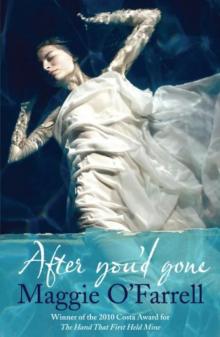 After You'd Gone
After You'd Gone The Hand That First Held Mine
The Hand That First Held Mine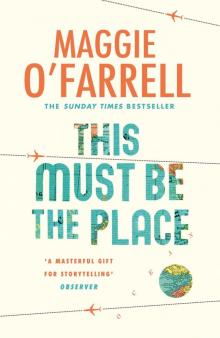 This Must Be the Place
This Must Be the Place My Lover's Lover
My Lover's Lover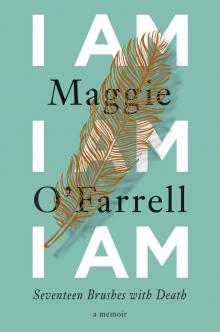 I Am, I Am, I Am: Seventeen Brushes With Death
I Am, I Am, I Am: Seventeen Brushes With Death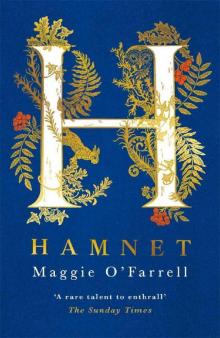 Hamnet
Hamnet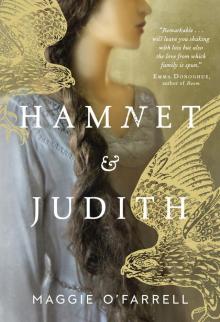 Hamnet and Judith
Hamnet and Judith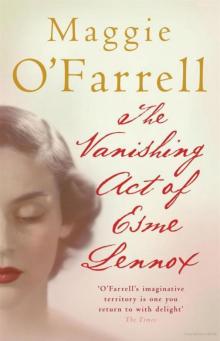 The Vanishing Act of Esme Lennox
The Vanishing Act of Esme Lennox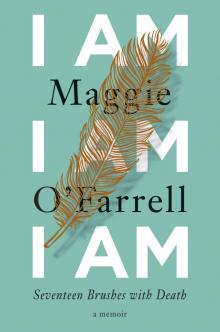 I Am, I Am, I Am
I Am, I Am, I Am